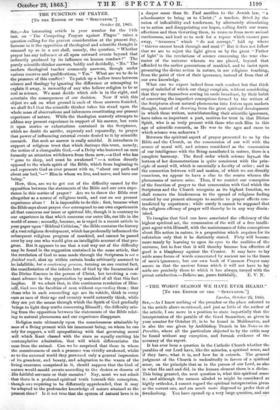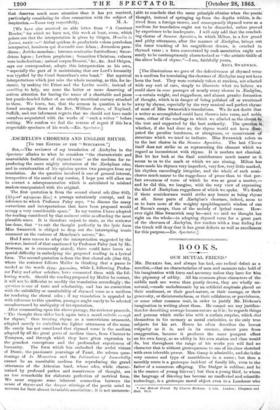"THE WORST SERMON WE HAVE EVER HEARD."
[To THE EDITOR OF THE " SPECTATOR.1
London, October 25, 1865. Sin,—As I know nothing of the preacher or the place referred to in the article above-mentioned, and just as little of the author of the article, I am more in a position to state impartially that the interpretation of the parable of the Good Samaritan, as given in your number for October 21, is to be found in Maldonatus, and is also the one given by Archbishop Trench in his Notes on the Parables, where all the particulars objected to by the critic may be found without any exception, and furnish evidence of the accuracy of the report.
It has ever been a question in the Catholic Church whether the parables of our Lord have, like the miracles, a spiritual sense, and if they have, what it is, and how far it extends. The general judgment of the Church is undoubtedly in favour of a spiritual sense, on the principle that as in the person of our Lord, so also in what He said and did, in the human element there is a divine. This being granted, the next question is, what this spiritual sense is ; and although the sermon alluded to might be considered as highly orthodox, I cannot regard the spiritual interpretation given as the correct one, and am much more disposed to prefer that of Swedenborg. You have openea up a very large question, and one that deserves much more attention than it has yet received, particularly considering its close connection with the subject of inspiration.—Yours very respectfully, M. A.
[We have also received an able letter from "A Constant Reader," for which we have not, this week at least, room, which points out that the interpretation is given by Origen, Homilia in Lucanz,xxxiv :—" Aiebat quidem de presbyteris volens parabolam interpretari, hominem qui descendit esse Adam ; Jerusalem pare- disum ; Jericho mundum ; latrones contraries fortitudines ; Sacer- dotem legem ; Levitem prophetas ; Sarnariten Christum, vulnera vero inobedentiam ; animal corpus Domini," &c., &c. And Origen, says our correspondent, adopts this interpretation as his own, "especially the part of it maintaining that our Lord's humanity was typified by the Good Samaritan's own beast." But mystical interpretations which just miss the whole meaning, as this, for in- stance, by making the Priest and the Levite unable, instead of unwilling to help, are none the better or more deserving of serious attention for having the name of a charitable and pious but puzzle-headed father of an utterly uncritical century attached to them. We learn, too, that the sermon in question is to be found amongst those of the Rev. William Jones, of Nayland, Suffolk, and our informant regrets that we should not have made ourselves acquainted with the works of "such a writer" before writing. We confess we feel the reverse of regret if this be a respectable specimen of his work.—En. Spectator.]































 Previous page
Previous page